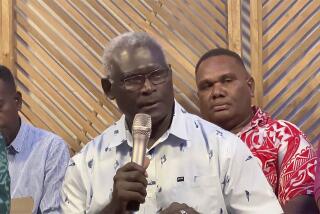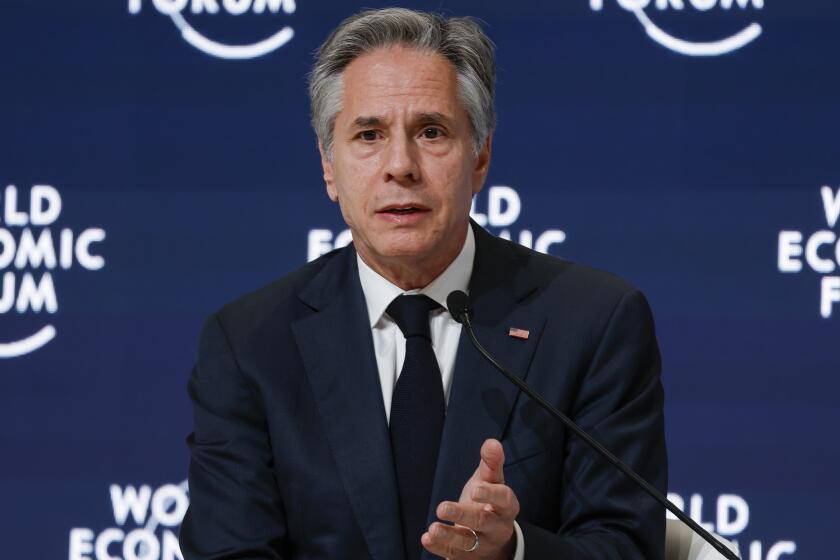Mugabe to share power with rival
Bitter rivals in Zimbabwe reached a power-sharing deal Thursday that leaves Robert Mugabe president and in control of the armed forces, but gives his opponents hope for enough power to rescue the shattered country.
The complicated agreement would make Mugabe’s rival, Morgan Tsvangirai of the Movement for Democratic Change, prime minister and create a government whose ministers would meet twice in parallel structures, once with the prime minister in charge and once under the president.
Details of how the government would resolve conflicts were unclear late Thursday. Some diplomats and observers doubt the opposition could wrest power from Mugabe.
If Mugabe retains control of the military, it is unclear whether Western powers will back the agreement and offer a financial package to help the country, which faces severe food shortages and hyperinflation running in the millions of percent, and whose industry and agriculture are in a state of collapse.
The deal comes after weeks of talks following Tsvangirai’s withdrawal from a June 27 presidential runoff vote because of violence against opposition activists.
Mugabe, 84, who has ruled the country since independence from Britain in 1980, was inaugurated despite condemnation of the vote as undemocratic by Western and African observers. During the election campaign, Mugabe said Tsvangirai and the Movement for Democratic Change, or MDC, would never be allowed to rule the country.
An opposition source who spoke on condition of anonymity said the proposal to have a Council of Ministers as well as a Cabinet broke a stalemate on who would have executive control.
“It’s the same group of people, which means they are actually making recommendations to themselves,” he said.
People close to the ruling ZANU-PF party said the deal would give Mugabe final control on government decisions. But the opposition believes that real power would be vested in the council under Tsvangirai, and that meeting again under Mugabe, the ministers would merely rubber-stamp their previous decisions.
“They came up with this roundabout arrangement in order to deal with the perception that Mugabe does want to feel as if he is in control of the Cabinet,” an opposition source said. “But effectively the power will be taken out of Cabinet and Cabinet becomes ceremonial.”
Another person close to the opposition added that MDC leaders believed they had enough power to address the country’s problems.
Because the economy is in ruins and Mugabe lacks a majority in parliament, his grip on power has looked increasingly tenuous. He was jeered by the opposition when he opened parliament last month, an incident that just months ago would have been unthinkable.
South African President Thabo Mbeki, who mediated the talks, said that some details had yet to be finalized and that the deal would be made public Monday, when it is to be signed.
The political editor of the pro-government Herald newspaper, Mabasa Sasa, said it was not yet clear how power would be divided between the president and the prime minister. “What we do not know is how far power extends within each office,” Sasa said.
The powerful Joint Operations Command, consisting of security and military chiefs, will be renamed the National Security Council. People close to the opposition and ZANU-PF said Mugabe would retain the chairmanship of that body.
“Obviously the people who are already there [in the ZANU-PF government] will play a dominant role because they will be running things from Day One while the newcomers will be trying to find their feet,” said a person close to the ruling party who spoke on condition of anonymity. “You don’t have to be a rocket scientist to work out that those who know the inner workings will have the upper hand over those who don’t.”
Mbeki said that only a deal made by the Zimbabweans themselves would stick.
“It’s made in Zimbabwe; it’s made by Zimbabweans. The rest of the world needs to respect that the people . . . have taken a decision about their own country,” Mbeki said.
--
More to Read
Start your day right
Sign up for Essential California for news, features and recommendations from the L.A. Times and beyond in your inbox six days a week.
You may occasionally receive promotional content from the Los Angeles Times.






